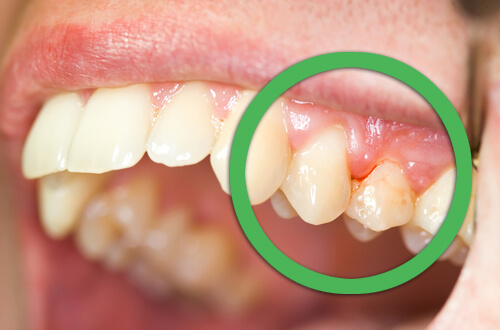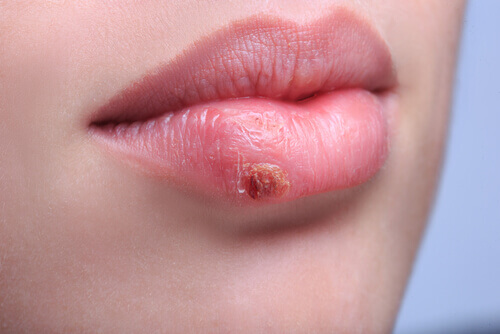5 Most Common Infections Transmitted through Kissing

Is kissing risky business? We’ll be finding all about infections transmitted through kissing and what you can do to avoid them.
Saliva is one of the main players in kissing. In other words, it’s inevitable that germs will be exchanged. The fact that little people pay attention to the disadvantages of kissing doesn’t mean that there are none.
The transfer of diseases and germs happens through our saliva. For the most part, the advantages of kissing are far greater than its risks! However, it’s never a bad idea to take certain precautions and avoid a “dangerous kiss”.
Be sure to read our list below.
Infections transmitted through kissing
1. Infectious mononucleosis

In common speech, it’s known as the “kissing disease” because it’s a virus that spreads via saliva exchange.
- It spreads via the Epstein Barr virus and mouth fluids.
- This virus commonly occurs in adolescents and young people. However, there isn’t a set age for contracting it.
- Among its symptoms are fever, sore throat and swollen lymph nodes.
How can you detect it?
After experiencing the previously mentioned symptoms, a medical specialist might send you for a blood test in order to test for the virus, and then prescribe medication depending on the results.
2. Cytomegalovirus
The second of our infections transmitted through kissing is cytomegalovirus. This virus is actually much more common than you’d think. Once the body contracts it, it’ll have it for life.
Cytomegalovirus is transmitted though direct contact of body fluids, blood transfusions or sexual contact.
- The surprising thing is that most of the people who have the virus aren’t aware of it. This is because people with a strong immune system don’t suffer too much because of it.
- However, in the case of children, you should take more precautions. This is because contracting the virus could result in problems throughout their life.
How can you detect it?
As with the previously mentioned virus, detection requires a blood sample. Most people with the virus don’t need treatment. Doctors will prescribe antivirals only in some cases and, of course, doctors recommend keeping good hygiene habits.
3. Gingivitis

Gingivitis is an infection that mainly affects the gums, causing the oral cavity to constantly secrete bacteria. The plaque that adheres to the teeth and gums is the cause of it. Some of the symptoms of gingivitis are bleeding as well as the reddening and inflammation in the affected area.
How can you detect it?
Upon experiencing any of these symptoms, you should make an appointment with your doctor. Gingivitis can also form deep pockets in between teeth and gums in addition to bad breath.
4. Streptococcal pharyngitis
Another of the infections transmitted through kissing is streptococcal pharyngitis, or strep throat, which is a very painful throat infection. Bacteria, in this case the A and B groups of streptococcus, directly attack the throat.
This infection spreads when a healthy person makes contact with someone who is infected. It can spread even through the simplest acts like sneezing or blowing your nose.
How can you detect it?
Among its symptoms are the following:
- Throat pain and irritation
- White spots in the back of the throat
- Swelling
- Headache
- Fever
In order to confirm a diagnosis, the medical specialist just needs a throat swab. If the results are still unclear, the specialist will take a throat culture.
5. Herpes labialis

This virus normally spreads through kissing. Herpes is an infection that can be found on the lips, mouth or gums. Its cause is a rather contagious virus called herpes (HSV).
How can you detect it?
Symptoms usually appear 1 or 2 weeks after being exposed to the virus. Herpes causes painful cold sores, as well as the following symptoms:
- Fever, lasting for more than 3 days
- Sore throat
- Swollen lymph nodes
Normally, the symptoms disappear within two weeks. A medical specialist can prescribe an antiviral drug, topical cream and relevant hygiene instructions.
We recommend: 7 Natural Treatments for Fighting Cold Sores
What should you before you kiss?
- Eat well in order to keep your immune system in good shape.
- Follow instructions in order to brush teeth properly.
- Don’t underestimate the importance of using dental floss.
- Get regular check-ups at least once a year.
- Change your toothbrush every three months.
- Using mouthwash help fight germs.
All cited sources were thoroughly reviewed by our team to ensure their quality, reliability, currency, and validity. The bibliography of this article was considered reliable and of academic or scientific accuracy.
- Port, A. D., Orlin, A., Kiss, S., Patel, S., D’Amico, D. J., & Gupta, M. P. (2017). Cytomegalovirus Retinitis: A Review. Journal of Ocular Pharmacology and Therapeutics. https://doi.org/10.1089/jop.2016.0140
- De Vries, K. (2015). Gingivitis. Australian Journal of Pharmacy. https://doi.org/10.1111/j.1600-051X.1986.tb01471.x
- Birkmann, A., & Zimmermann, H. (2016). HSV antivirals – Current and future treatment options. Current Opinion in Virology. https://doi.org/10.1016/j.coviro.2016.01.013
This text is provided for informational purposes only and does not replace consultation with a professional. If in doubt, consult your specialist.








